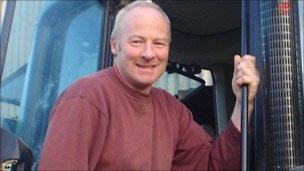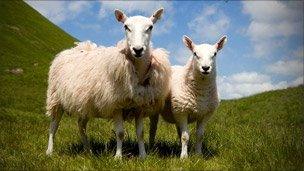National Farmers Union says animal theft is on the rise
- Published

Malcolm Roberts had 45 breeding ewes taken from his north Shropshire field
The National Farmers Union Mutual insurance company has reported a 500% rise in claims for stolen animals over the past year.
The company is warning that the problem could become even worse this year.
Shropshire farmer, and a former county chairman of the NFU, Malcolm Roberts had 45 breeding ewes stolen from his field.
He said the rise in the thefts coincided with an increase in the price of lamb.
Nicki Whittaker, a spokesperson for NFU insurance, said: "We saw a problem last year when the price of lamb actually rose from £2.70 a kilo to over £4 a kilo.
"Whenever we see a rise in the prices of any commodity it's usually followed by a spate of thefts."
Malcolm Roberts, who farms in north Shropshire, said he had lost 45 breeding ewes to rustlers last year. They were taken from a field of 160 animals.
Although he claimed about £120 for each animal through insurance, he said it did not totally compensate for the loss.

The number of animals stolen from farms has risen by 500%
"They still had to be replaced and that's an expense, but of course, the bottom line is that our insurance premium has had to go up," he said.
He said the electronic tagging introduced last January had helped prevent theft, but it was not foolproof and there had been instances where the tags had been removed and replaced illegally.
This, he said, could be a health hazard.
"The details need to be submitted at the destination of those animals for traceability and biosecurity.
"It does concern us that these animals may well be moving around the countryside and they could potentially be carrying infection."
Mr Roberts said there was a further problem that animals might still have traces of medication they had previously been given when the thieves sent them for slaughter.
In some cases animals have been shot and butchered in the field.
Mr Roberts said if just one or two animals were taken from a large flock, their loss might not be noticed immediately.
"The offal and the skin left in the field are the first sign that you actually realise there's one missing," he said.
He added older sheep were being targeted because mutton was becoming more popular.
"It is very concerning for the agricultural community."
- Published14 April 2011
- Published5 December 2010